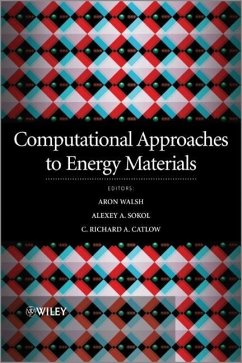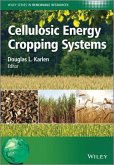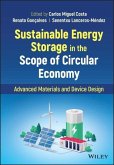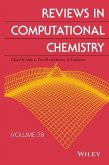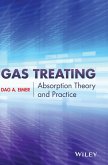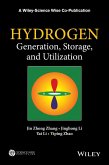Richard Catlow, Alexey Sokol, Aron Walsh
Computational Approaches to Energy Materials
Herausgeber: Catlow, Richard; Walsh, Aron; Sokol, Alexey
Richard Catlow, Alexey Sokol, Aron Walsh
Computational Approaches to Energy Materials
Herausgeber: Catlow, Richard; Walsh, Aron; Sokol, Alexey
- Gebundenes Buch
- Merkliste
- Auf die Merkliste
- Bewerten Bewerten
- Teilen
- Produkt teilen
- Produkterinnerung
- Produkterinnerung
The development of materials for clean and efficient energy generation and storage is one of the most rapidly developing, multi-disciplinary areas of contemporary science, driven primarily by concerns over global warming, diminishing fossil-fuel reserves, the need for energy security, and increasing consumer demand for portable electronics. Computational methods are now an integral and indispensable part of the materials characterisation and development process.
Computational Approaches to Energy Materials presents a detailed survey of current computational techniques for the development…mehr
Andere Kunden interessierten sich auch für
![Green Energetic Materials Green Energetic Materials]() Green Energetic Materials193,99 €
Green Energetic Materials193,99 €![Cellulosic Energy Cropping Systems Cellulosic Energy Cropping Systems]() Cellulosic Energy Cropping Systems141,99 €
Cellulosic Energy Cropping Systems141,99 €![Sustainable Energy Storage in the Scope of Circular Economy Sustainable Energy Storage in the Scope of Circular Economy]() CM CostaSustainable Energy Storage in the Scope of Circular Economy193,99 €
CM CostaSustainable Energy Storage in the Scope of Circular Economy193,99 €![Reviews in Computational Chemistry, Volume 28 Reviews in Computational Chemistry, Volume 28]() Reviews in Computational Chemistry, Volume 28227,99 €
Reviews in Computational Chemistry, Volume 28227,99 €![Gas Treating Gas Treating]() Dag EimerGas Treating171,99 €
Dag EimerGas Treating171,99 €![Aqueous Pretreatment of Plant Biomass for Biological and Chemical Conversion to Fuels and Chemicals Aqueous Pretreatment of Plant Biomass for Biological and Chemical Conversion to Fuels and Chemicals]() Aqueous Pretreatment of Plant Biomass for Biological and Chemical Conversion to Fuels and Chemicals160,99 €
Aqueous Pretreatment of Plant Biomass for Biological and Chemical Conversion to Fuels and Chemicals160,99 €![Hydrogen Generation, Storage and Utilization Hydrogen Generation, Storage and Utilization]() Jin Zhong ZhangHydrogen Generation, Storage and Utilization136,99 €
Jin Zhong ZhangHydrogen Generation, Storage and Utilization136,99 €-
-
-
The development of materials for clean and efficient energy generation and storage is one of the most rapidly developing, multi-disciplinary areas of contemporary science, driven primarily by concerns over global warming, diminishing fossil-fuel reserves, the need for energy security, and increasing consumer demand for portable electronics. Computational methods are now an integral and indispensable part of the materials characterisation and development process.
Computational Approaches to Energy Materials presents a detailed survey of current computational techniques for the development and optimization of energy materials, outlining their strengths, limitations, and future applications. The review of techniques includes current methodologies based on electronic structure, interatomic potential and hybrid methods. The methodological components are integrated into a comprehensive survey of applications, addressing the major themes in energy research.
Topics covered include:
Introduction to computational methods and approaches
Modelling materials for energy generation applications: solar energy and nuclear energy
Modelling materials for storage applications: batteries and hydrogen
Modelling materials for energy conversion applications: fuel cells, heterogeneous catalysis and solid-state lighting
Nanostructures for energy applications
This full colour text is an accessible introduction for newcomers to the field, and a valuable reference source for experienced researchers working on computational techniques and their application to energy materials.
Computational Approaches to Energy Materials presents a detailed survey of current computational techniques for the development and optimization of energy materials, outlining their strengths, limitations, and future applications. The review of techniques includes current methodologies based on electronic structure, interatomic potential and hybrid methods. The methodological components are integrated into a comprehensive survey of applications, addressing the major themes in energy research.
Topics covered include:
Introduction to computational methods and approaches
Modelling materials for energy generation applications: solar energy and nuclear energy
Modelling materials for storage applications: batteries and hydrogen
Modelling materials for energy conversion applications: fuel cells, heterogeneous catalysis and solid-state lighting
Nanostructures for energy applications
This full colour text is an accessible introduction for newcomers to the field, and a valuable reference source for experienced researchers working on computational techniques and their application to energy materials.
Produktdetails
- Produktdetails
- Verlag: Wiley & Sons
- 1. Auflage
- Seitenzahl: 318
- Erscheinungstermin: 4. Juni 2013
- Englisch
- Abmessung: 251mm x 172mm x 22mm
- Gewicht: 753g
- ISBN-13: 9781119950936
- ISBN-10: 1119950937
- Artikelnr.: 36873813
- Verlag: Wiley & Sons
- 1. Auflage
- Seitenzahl: 318
- Erscheinungstermin: 4. Juni 2013
- Englisch
- Abmessung: 251mm x 172mm x 22mm
- Gewicht: 753g
- ISBN-13: 9781119950936
- ISBN-10: 1119950937
- Artikelnr.: 36873813
Professor Richard Catlow is the Dean of the Faculty of Mathematical and Physical Sciences at University College London and a Fellow of the Royal Society. He has worked in the field of computational and experimental studies of complex inorganic materials for over 30 years, pioneering a wide range of applications of computational techniques. His current research involves exploring the structures, properties and reactivities of complex materials including micro and mesoporous catalysts, electronic ceramics, minerals, fast ion conductors and molecular materials. Professor Catlow has published over 800 papers and authored or co-authored 12 books, including the widely used Computer Simulation of Solids and the influential Computer Modeling of Microporous Materials. Dr Alexey Sokol is a Senior Research Associate at University College London, where he has worked on the development and applications of computational methods for solid-state physics, chemistry and materials science for over 20 years. He has recently been involved with the development of multi-scale computational approaches to facilitate the accurate modelling of catalytic and defect processes in oxide and semiconducting materials. Dr Aron Walsh is a Marie Curie Fellow at University College London with a long standing interest in energy materials following postdoctoral work at the National Renewable Energy Laboratory (USA) where he still maintains close links. He has applied electronic structure techniques to the design of novel solar cell and solid-state lighting materials, and has pioneered a new field of theoretical research into semiconducting metal organic frameworks.
About the Editors xi List of Contributors xiii Preface xv Acknowledgments
xvii 1 Computational Techniques 1 C. Richard A. Catlow, Alexey A. Sokol,
and Aron Walsh 1.1 Introduction 1 1.2 Atomistic Simulations 1 1.2.1 Basic
Concepts 1 1.2.2 Parameterization 3 1.2.3 Parameter Sets 3 1.2.4
Implementation 4 1.3 Electronic Structure Techniques 6 1.3.1 Wavefunction
Methods 8 1.3.1.1 Hartree-Fock Theory 9 1.3.1.2 Post-Hartree-Fock
Approaches 10 1.3.1.3 Semi-empirical Wavefunction Methods 11 1.3.2 Density
Functional Theory 12 1.3.2.1 Exchange-Correlation Functionals 12 1.3.2.2
Semi-empirical Density Functional Approaches 14 1.3.3 Excited States 15 1.4
Multiscale Approaches 15 1.4.1 Hybrid QM/MM Embedding Techniques 16 1.4.2
Beyond Atomistic Models 17 1.5 Boundary Conditions 19 1.6 Point-Defect
Simulations 21 1.6.1 Mott-Littleton Approach 21 1.6.2 Periodic Supercell
Approach 24 1.7 Summary 25 References 25 2 Energy Generation: Solar Energy
29 Silvana Botti and Julien Vidal 2.1 Thin-Film Photovoltaics 29 2.2
First-Principles Methods for Electronic Excitations 32 2.2.1 Hedin's
Equations and the GW Approximation 34 2.2.2 Hybrid Functionals 38 2.2.3
Bethe-Salpeter Equation 40 2.2.4 Model Kernels for TDDFT 41 2.3 Examples of
Applications 42 2.3.1 Cu-Based Thin-Film Absorbers 43 2.3.2 Delafossite
Transparent Conductive Oxides 54 2.4 Conclusions 60 References 61 3 Energy
Generation: Nuclear Energy 71 Dorothy Duffy 3.1 Introduction 71 3.2
Radiation Effects in Nuclear Materials 72 3.2.1 Fission 72 3.2.1.1
Structural Materials 73 3.2.1.2 Fuel 76 3.2.1.3 Cladding 79 3.2.2 Fusion 80
3.2.2.1 Structural Materials 81 3.2.2.2 Plasma-Facing Materials 82 3.2.3
Waste Disposal 83 3.3 Modeling Radiation Effects 85 3.3.1 BCA Modeling 86
3.3.2 Molecular Dynamics 87 3.3.2.1 Cascade Simulations 87 3.3.2.2
Sputtering Simulations 93 3.3.3 Monte Carlo Simulations 94 3.3.3.1 Kinetic
Monte Carlo 95 3.3.3.2 Object Kinetic Monte Carlo 96 3.3.3.3 Transition
Rates 97 3.3.3.4 Examples 98 3.3.4 Cluster Dynamics 99 3.3.4.1 Examples 99
3.3.4.2 Comparison with OKMC 100 3.3.5 Density Functional Theory 101
3.3.5.1 Interatomic Potentials 101 3.3.5.2 Transition Rates 102 3.4 Summary
and Outlook 102 References 104 4 Energy Storage: Rechargeable Lithium
Batteries 109 M. Saiful Islam and Craig A.J. Fisher 4.1 Introduction 109
4.2 Overview of Computational Approaches 110 4.3 Li-Ion Batteries 112 4.4
Cell Voltages and Structural Phase Stability 113 4.5 Li-Ion Diffusion and
Defect Properties 116 4.6 Surfaces and Morphology 121 4.7 Current Trends
and Future Directions 124 4.8 Concluding Remarks 125 References 125 5
Energy Storage: Hydrogen 131 Viet-Duc Le and Yong-Hyun Kim 5.1 Introduction
131 5.2 Computational Approach in Hydrogen Storage Research 133 5.3
Chemisorption Approach 133 5.4 Physisorption Approach 136 5.5 Spillover
Approach 138 5.6 Kubas-Type Approach 138 5.7 Conclusion 145 References 146
6 Energy Conversion: Solid Oxide Fuel Cells 149 E.A. Kotomin, R. Merkle,
Y.A. Mastrikov, M.M. Kuklja, and J. Maier 6.1 Introduction 149 6.2
Computational Details 152 6.3 Cathode Materials and Reactions 155 6.3.1
Surfaces: LaMnO3 and (La,Sr)MnO3 Perovskites 155 6.3.1.1 Surface
Termination, Surface Point Defects 155 6.3.1.2 Oxygen Adsorption and
Diffusion 158 6.3.1.3 Rate-Determining Step of the Surface Reaction 160
6.3.2 Bulk Properties of Multicomponent Perovskites 164 6.3.2.1 Oxygen
Vacancy Formation in (Ba,Sr)(Co,Fe)O3.delta 164 6.3.2.2 Oxygen Vacancy
Migration in (Ba,Sr)(Co,Fe)O3.delta 167 6.3.2.3 Disorder and Cation
Rearrangement in (Ba,Sr)(Co,Fe)O3.delta 170 6.3.3 Defects in
(La,Sr)(Co,Fe)O3.delta 173 6.4 Ion Transport in Electrolytes: Recent
Studies 175 6.5 Reactions at SOFC Anodes 176 6.6 Conclusions 177
Acknowledgments 178 References 178 7 Energy Conversion: Heterogeneous
Catalysis 187 Rutger A. van Santen, Evgeny A. Pidko, and Emiel J.M. Hensen
7.1 Introduction 187 7.1.1 Particle Size Dependence of Catalytic Reactivity
191 7.1.2 Activity and Selectivity as a Function of the Metal Type 192
7.1.3 Reactivity as a Function of State of the Surface 193 7.1.4 Mechanism
of Acid Catalysis: Single Site versus Dual Site 193 7.2 Basic Concepts of
Heterogeneous Catalysis 195 7.3 Surface Sensitivity in CH Activation 198
7.3.1 Homolytic Activation of CH Bonds 198 7.3.2 Heterolytic Activation of
CH Bonds 203 7.3.2.1 Brønsted Acid Catalysis 204 7.3.2.2 Lewis Acid
Catalysis 206 7.4 Surface Sensitivity for the C.C Bond Formation 209 7.4.1
Transition Metal Catalyzed FT Reaction 209 7.4.2 C.C Bond Formation
Catalyzed by Zeolitic Brønsted Acids 213 7.5 Structure and Surface
Composition Sensitivity: Oxygen Insertion versus CH Bond Cleavage 217 7.5.1
Silver-Catalyzed Ethylene Epoxidation 217 7.5.2 Benzene Oxidation by
Iron-Modified Zeolite 221 7.6 Conclusion 223 References 224 8 Energy
Conversion: Solid-State Lighting 231 E. Kioupakis, P. Rinke, A. Janotti, Q.
Yan, and C.G. Van de Walle 8.1 Introduction to Solid-State Lighting 231 8.2
Structure and Electronic Properties of Nitride Materials 234 8.2.1 Density
Functional Theory and Ground-State Properties 234 8.2.2 Electronic
Excitations: GW and Exact Exchange 236 8.2.3 Electronic Excitations: Hybrid
Functionals 240 8.2.4 Band-gap Bowing and Band Alignments 240 8.2.5 Strain
and Deformation Potentials 241 8.3 Defects in Nitride Materials 243 8.3.1
Methodology 244 8.3.2 Example: C in GaN 246 8.4 Auger Recombination and
Efficiency Droop Problem of Nitride LEDs 248 8.4.1 Efficiency Droop 248
8.4.2 Auger Recombination 249 8.4.3 Computational Methodology 251 8.4.4
Results 252 8.5 Summary 254 Acknowledgments 255 References 255 9 Toward the
Nanoscale 261 Phuti E. Ngoepe, Rapela R. Maphanga, and Dean C. Sayle 9.1
Introduction 261 9.2 Review of Simulation Methods 263 9.2.1 Established
Computational Methods 263 9.2.2 Evolutionary Methods 263 9.2.2.1 GM Methods
263 9.2.2.2 Amorphization and Recrystallization 264 9.3 Applications 266
9.3.1 Nanoclusters 266 9.3.1.1 ZnO 266 9.3.1.2 ZnS 268 9.3.1.3 MnO2 269
9.3.1.4 TiO2 271 9.3.2 Nanoarchitectures 272 9.3.2.1 MnO2 Nanoparticle
(Nucleation and Crystallization) 272 9.3.2.2 MnO2 Bulk 275 9.3.2.3 MnO2
Nanoporous 278 9.3.2.4 TiO2 Nanoporous 284 9.3.2.5 ZnS and ZnO Nanoporous
286 9.4 Summary and Conclusion 289 Acknowledgments 290 References 290
Further Reading 295 Index 297
xvii 1 Computational Techniques 1 C. Richard A. Catlow, Alexey A. Sokol,
and Aron Walsh 1.1 Introduction 1 1.2 Atomistic Simulations 1 1.2.1 Basic
Concepts 1 1.2.2 Parameterization 3 1.2.3 Parameter Sets 3 1.2.4
Implementation 4 1.3 Electronic Structure Techniques 6 1.3.1 Wavefunction
Methods 8 1.3.1.1 Hartree-Fock Theory 9 1.3.1.2 Post-Hartree-Fock
Approaches 10 1.3.1.3 Semi-empirical Wavefunction Methods 11 1.3.2 Density
Functional Theory 12 1.3.2.1 Exchange-Correlation Functionals 12 1.3.2.2
Semi-empirical Density Functional Approaches 14 1.3.3 Excited States 15 1.4
Multiscale Approaches 15 1.4.1 Hybrid QM/MM Embedding Techniques 16 1.4.2
Beyond Atomistic Models 17 1.5 Boundary Conditions 19 1.6 Point-Defect
Simulations 21 1.6.1 Mott-Littleton Approach 21 1.6.2 Periodic Supercell
Approach 24 1.7 Summary 25 References 25 2 Energy Generation: Solar Energy
29 Silvana Botti and Julien Vidal 2.1 Thin-Film Photovoltaics 29 2.2
First-Principles Methods for Electronic Excitations 32 2.2.1 Hedin's
Equations and the GW Approximation 34 2.2.2 Hybrid Functionals 38 2.2.3
Bethe-Salpeter Equation 40 2.2.4 Model Kernels for TDDFT 41 2.3 Examples of
Applications 42 2.3.1 Cu-Based Thin-Film Absorbers 43 2.3.2 Delafossite
Transparent Conductive Oxides 54 2.4 Conclusions 60 References 61 3 Energy
Generation: Nuclear Energy 71 Dorothy Duffy 3.1 Introduction 71 3.2
Radiation Effects in Nuclear Materials 72 3.2.1 Fission 72 3.2.1.1
Structural Materials 73 3.2.1.2 Fuel 76 3.2.1.3 Cladding 79 3.2.2 Fusion 80
3.2.2.1 Structural Materials 81 3.2.2.2 Plasma-Facing Materials 82 3.2.3
Waste Disposal 83 3.3 Modeling Radiation Effects 85 3.3.1 BCA Modeling 86
3.3.2 Molecular Dynamics 87 3.3.2.1 Cascade Simulations 87 3.3.2.2
Sputtering Simulations 93 3.3.3 Monte Carlo Simulations 94 3.3.3.1 Kinetic
Monte Carlo 95 3.3.3.2 Object Kinetic Monte Carlo 96 3.3.3.3 Transition
Rates 97 3.3.3.4 Examples 98 3.3.4 Cluster Dynamics 99 3.3.4.1 Examples 99
3.3.4.2 Comparison with OKMC 100 3.3.5 Density Functional Theory 101
3.3.5.1 Interatomic Potentials 101 3.3.5.2 Transition Rates 102 3.4 Summary
and Outlook 102 References 104 4 Energy Storage: Rechargeable Lithium
Batteries 109 M. Saiful Islam and Craig A.J. Fisher 4.1 Introduction 109
4.2 Overview of Computational Approaches 110 4.3 Li-Ion Batteries 112 4.4
Cell Voltages and Structural Phase Stability 113 4.5 Li-Ion Diffusion and
Defect Properties 116 4.6 Surfaces and Morphology 121 4.7 Current Trends
and Future Directions 124 4.8 Concluding Remarks 125 References 125 5
Energy Storage: Hydrogen 131 Viet-Duc Le and Yong-Hyun Kim 5.1 Introduction
131 5.2 Computational Approach in Hydrogen Storage Research 133 5.3
Chemisorption Approach 133 5.4 Physisorption Approach 136 5.5 Spillover
Approach 138 5.6 Kubas-Type Approach 138 5.7 Conclusion 145 References 146
6 Energy Conversion: Solid Oxide Fuel Cells 149 E.A. Kotomin, R. Merkle,
Y.A. Mastrikov, M.M. Kuklja, and J. Maier 6.1 Introduction 149 6.2
Computational Details 152 6.3 Cathode Materials and Reactions 155 6.3.1
Surfaces: LaMnO3 and (La,Sr)MnO3 Perovskites 155 6.3.1.1 Surface
Termination, Surface Point Defects 155 6.3.1.2 Oxygen Adsorption and
Diffusion 158 6.3.1.3 Rate-Determining Step of the Surface Reaction 160
6.3.2 Bulk Properties of Multicomponent Perovskites 164 6.3.2.1 Oxygen
Vacancy Formation in (Ba,Sr)(Co,Fe)O3.delta 164 6.3.2.2 Oxygen Vacancy
Migration in (Ba,Sr)(Co,Fe)O3.delta 167 6.3.2.3 Disorder and Cation
Rearrangement in (Ba,Sr)(Co,Fe)O3.delta 170 6.3.3 Defects in
(La,Sr)(Co,Fe)O3.delta 173 6.4 Ion Transport in Electrolytes: Recent
Studies 175 6.5 Reactions at SOFC Anodes 176 6.6 Conclusions 177
Acknowledgments 178 References 178 7 Energy Conversion: Heterogeneous
Catalysis 187 Rutger A. van Santen, Evgeny A. Pidko, and Emiel J.M. Hensen
7.1 Introduction 187 7.1.1 Particle Size Dependence of Catalytic Reactivity
191 7.1.2 Activity and Selectivity as a Function of the Metal Type 192
7.1.3 Reactivity as a Function of State of the Surface 193 7.1.4 Mechanism
of Acid Catalysis: Single Site versus Dual Site 193 7.2 Basic Concepts of
Heterogeneous Catalysis 195 7.3 Surface Sensitivity in CH Activation 198
7.3.1 Homolytic Activation of CH Bonds 198 7.3.2 Heterolytic Activation of
CH Bonds 203 7.3.2.1 Brønsted Acid Catalysis 204 7.3.2.2 Lewis Acid
Catalysis 206 7.4 Surface Sensitivity for the C.C Bond Formation 209 7.4.1
Transition Metal Catalyzed FT Reaction 209 7.4.2 C.C Bond Formation
Catalyzed by Zeolitic Brønsted Acids 213 7.5 Structure and Surface
Composition Sensitivity: Oxygen Insertion versus CH Bond Cleavage 217 7.5.1
Silver-Catalyzed Ethylene Epoxidation 217 7.5.2 Benzene Oxidation by
Iron-Modified Zeolite 221 7.6 Conclusion 223 References 224 8 Energy
Conversion: Solid-State Lighting 231 E. Kioupakis, P. Rinke, A. Janotti, Q.
Yan, and C.G. Van de Walle 8.1 Introduction to Solid-State Lighting 231 8.2
Structure and Electronic Properties of Nitride Materials 234 8.2.1 Density
Functional Theory and Ground-State Properties 234 8.2.2 Electronic
Excitations: GW and Exact Exchange 236 8.2.3 Electronic Excitations: Hybrid
Functionals 240 8.2.4 Band-gap Bowing and Band Alignments 240 8.2.5 Strain
and Deformation Potentials 241 8.3 Defects in Nitride Materials 243 8.3.1
Methodology 244 8.3.2 Example: C in GaN 246 8.4 Auger Recombination and
Efficiency Droop Problem of Nitride LEDs 248 8.4.1 Efficiency Droop 248
8.4.2 Auger Recombination 249 8.4.3 Computational Methodology 251 8.4.4
Results 252 8.5 Summary 254 Acknowledgments 255 References 255 9 Toward the
Nanoscale 261 Phuti E. Ngoepe, Rapela R. Maphanga, and Dean C. Sayle 9.1
Introduction 261 9.2 Review of Simulation Methods 263 9.2.1 Established
Computational Methods 263 9.2.2 Evolutionary Methods 263 9.2.2.1 GM Methods
263 9.2.2.2 Amorphization and Recrystallization 264 9.3 Applications 266
9.3.1 Nanoclusters 266 9.3.1.1 ZnO 266 9.3.1.2 ZnS 268 9.3.1.3 MnO2 269
9.3.1.4 TiO2 271 9.3.2 Nanoarchitectures 272 9.3.2.1 MnO2 Nanoparticle
(Nucleation and Crystallization) 272 9.3.2.2 MnO2 Bulk 275 9.3.2.3 MnO2
Nanoporous 278 9.3.2.4 TiO2 Nanoporous 284 9.3.2.5 ZnS and ZnO Nanoporous
286 9.4 Summary and Conclusion 289 Acknowledgments 290 References 290
Further Reading 295 Index 297
About the Editors xi List of Contributors xiii Preface xv Acknowledgments
xvii 1 Computational Techniques 1 C. Richard A. Catlow, Alexey A. Sokol,
and Aron Walsh 1.1 Introduction 1 1.2 Atomistic Simulations 1 1.2.1 Basic
Concepts 1 1.2.2 Parameterization 3 1.2.3 Parameter Sets 3 1.2.4
Implementation 4 1.3 Electronic Structure Techniques 6 1.3.1 Wavefunction
Methods 8 1.3.1.1 Hartree-Fock Theory 9 1.3.1.2 Post-Hartree-Fock
Approaches 10 1.3.1.3 Semi-empirical Wavefunction Methods 11 1.3.2 Density
Functional Theory 12 1.3.2.1 Exchange-Correlation Functionals 12 1.3.2.2
Semi-empirical Density Functional Approaches 14 1.3.3 Excited States 15 1.4
Multiscale Approaches 15 1.4.1 Hybrid QM/MM Embedding Techniques 16 1.4.2
Beyond Atomistic Models 17 1.5 Boundary Conditions 19 1.6 Point-Defect
Simulations 21 1.6.1 Mott-Littleton Approach 21 1.6.2 Periodic Supercell
Approach 24 1.7 Summary 25 References 25 2 Energy Generation: Solar Energy
29 Silvana Botti and Julien Vidal 2.1 Thin-Film Photovoltaics 29 2.2
First-Principles Methods for Electronic Excitations 32 2.2.1 Hedin's
Equations and the GW Approximation 34 2.2.2 Hybrid Functionals 38 2.2.3
Bethe-Salpeter Equation 40 2.2.4 Model Kernels for TDDFT 41 2.3 Examples of
Applications 42 2.3.1 Cu-Based Thin-Film Absorbers 43 2.3.2 Delafossite
Transparent Conductive Oxides 54 2.4 Conclusions 60 References 61 3 Energy
Generation: Nuclear Energy 71 Dorothy Duffy 3.1 Introduction 71 3.2
Radiation Effects in Nuclear Materials 72 3.2.1 Fission 72 3.2.1.1
Structural Materials 73 3.2.1.2 Fuel 76 3.2.1.3 Cladding 79 3.2.2 Fusion 80
3.2.2.1 Structural Materials 81 3.2.2.2 Plasma-Facing Materials 82 3.2.3
Waste Disposal 83 3.3 Modeling Radiation Effects 85 3.3.1 BCA Modeling 86
3.3.2 Molecular Dynamics 87 3.3.2.1 Cascade Simulations 87 3.3.2.2
Sputtering Simulations 93 3.3.3 Monte Carlo Simulations 94 3.3.3.1 Kinetic
Monte Carlo 95 3.3.3.2 Object Kinetic Monte Carlo 96 3.3.3.3 Transition
Rates 97 3.3.3.4 Examples 98 3.3.4 Cluster Dynamics 99 3.3.4.1 Examples 99
3.3.4.2 Comparison with OKMC 100 3.3.5 Density Functional Theory 101
3.3.5.1 Interatomic Potentials 101 3.3.5.2 Transition Rates 102 3.4 Summary
and Outlook 102 References 104 4 Energy Storage: Rechargeable Lithium
Batteries 109 M. Saiful Islam and Craig A.J. Fisher 4.1 Introduction 109
4.2 Overview of Computational Approaches 110 4.3 Li-Ion Batteries 112 4.4
Cell Voltages and Structural Phase Stability 113 4.5 Li-Ion Diffusion and
Defect Properties 116 4.6 Surfaces and Morphology 121 4.7 Current Trends
and Future Directions 124 4.8 Concluding Remarks 125 References 125 5
Energy Storage: Hydrogen 131 Viet-Duc Le and Yong-Hyun Kim 5.1 Introduction
131 5.2 Computational Approach in Hydrogen Storage Research 133 5.3
Chemisorption Approach 133 5.4 Physisorption Approach 136 5.5 Spillover
Approach 138 5.6 Kubas-Type Approach 138 5.7 Conclusion 145 References 146
6 Energy Conversion: Solid Oxide Fuel Cells 149 E.A. Kotomin, R. Merkle,
Y.A. Mastrikov, M.M. Kuklja, and J. Maier 6.1 Introduction 149 6.2
Computational Details 152 6.3 Cathode Materials and Reactions 155 6.3.1
Surfaces: LaMnO3 and (La,Sr)MnO3 Perovskites 155 6.3.1.1 Surface
Termination, Surface Point Defects 155 6.3.1.2 Oxygen Adsorption and
Diffusion 158 6.3.1.3 Rate-Determining Step of the Surface Reaction 160
6.3.2 Bulk Properties of Multicomponent Perovskites 164 6.3.2.1 Oxygen
Vacancy Formation in (Ba,Sr)(Co,Fe)O3.delta 164 6.3.2.2 Oxygen Vacancy
Migration in (Ba,Sr)(Co,Fe)O3.delta 167 6.3.2.3 Disorder and Cation
Rearrangement in (Ba,Sr)(Co,Fe)O3.delta 170 6.3.3 Defects in
(La,Sr)(Co,Fe)O3.delta 173 6.4 Ion Transport in Electrolytes: Recent
Studies 175 6.5 Reactions at SOFC Anodes 176 6.6 Conclusions 177
Acknowledgments 178 References 178 7 Energy Conversion: Heterogeneous
Catalysis 187 Rutger A. van Santen, Evgeny A. Pidko, and Emiel J.M. Hensen
7.1 Introduction 187 7.1.1 Particle Size Dependence of Catalytic Reactivity
191 7.1.2 Activity and Selectivity as a Function of the Metal Type 192
7.1.3 Reactivity as a Function of State of the Surface 193 7.1.4 Mechanism
of Acid Catalysis: Single Site versus Dual Site 193 7.2 Basic Concepts of
Heterogeneous Catalysis 195 7.3 Surface Sensitivity in CH Activation 198
7.3.1 Homolytic Activation of CH Bonds 198 7.3.2 Heterolytic Activation of
CH Bonds 203 7.3.2.1 Brønsted Acid Catalysis 204 7.3.2.2 Lewis Acid
Catalysis 206 7.4 Surface Sensitivity for the C.C Bond Formation 209 7.4.1
Transition Metal Catalyzed FT Reaction 209 7.4.2 C.C Bond Formation
Catalyzed by Zeolitic Brønsted Acids 213 7.5 Structure and Surface
Composition Sensitivity: Oxygen Insertion versus CH Bond Cleavage 217 7.5.1
Silver-Catalyzed Ethylene Epoxidation 217 7.5.2 Benzene Oxidation by
Iron-Modified Zeolite 221 7.6 Conclusion 223 References 224 8 Energy
Conversion: Solid-State Lighting 231 E. Kioupakis, P. Rinke, A. Janotti, Q.
Yan, and C.G. Van de Walle 8.1 Introduction to Solid-State Lighting 231 8.2
Structure and Electronic Properties of Nitride Materials 234 8.2.1 Density
Functional Theory and Ground-State Properties 234 8.2.2 Electronic
Excitations: GW and Exact Exchange 236 8.2.3 Electronic Excitations: Hybrid
Functionals 240 8.2.4 Band-gap Bowing and Band Alignments 240 8.2.5 Strain
and Deformation Potentials 241 8.3 Defects in Nitride Materials 243 8.3.1
Methodology 244 8.3.2 Example: C in GaN 246 8.4 Auger Recombination and
Efficiency Droop Problem of Nitride LEDs 248 8.4.1 Efficiency Droop 248
8.4.2 Auger Recombination 249 8.4.3 Computational Methodology 251 8.4.4
Results 252 8.5 Summary 254 Acknowledgments 255 References 255 9 Toward the
Nanoscale 261 Phuti E. Ngoepe, Rapela R. Maphanga, and Dean C. Sayle 9.1
Introduction 261 9.2 Review of Simulation Methods 263 9.2.1 Established
Computational Methods 263 9.2.2 Evolutionary Methods 263 9.2.2.1 GM Methods
263 9.2.2.2 Amorphization and Recrystallization 264 9.3 Applications 266
9.3.1 Nanoclusters 266 9.3.1.1 ZnO 266 9.3.1.2 ZnS 268 9.3.1.3 MnO2 269
9.3.1.4 TiO2 271 9.3.2 Nanoarchitectures 272 9.3.2.1 MnO2 Nanoparticle
(Nucleation and Crystallization) 272 9.3.2.2 MnO2 Bulk 275 9.3.2.3 MnO2
Nanoporous 278 9.3.2.4 TiO2 Nanoporous 284 9.3.2.5 ZnS and ZnO Nanoporous
286 9.4 Summary and Conclusion 289 Acknowledgments 290 References 290
Further Reading 295 Index 297
xvii 1 Computational Techniques 1 C. Richard A. Catlow, Alexey A. Sokol,
and Aron Walsh 1.1 Introduction 1 1.2 Atomistic Simulations 1 1.2.1 Basic
Concepts 1 1.2.2 Parameterization 3 1.2.3 Parameter Sets 3 1.2.4
Implementation 4 1.3 Electronic Structure Techniques 6 1.3.1 Wavefunction
Methods 8 1.3.1.1 Hartree-Fock Theory 9 1.3.1.2 Post-Hartree-Fock
Approaches 10 1.3.1.3 Semi-empirical Wavefunction Methods 11 1.3.2 Density
Functional Theory 12 1.3.2.1 Exchange-Correlation Functionals 12 1.3.2.2
Semi-empirical Density Functional Approaches 14 1.3.3 Excited States 15 1.4
Multiscale Approaches 15 1.4.1 Hybrid QM/MM Embedding Techniques 16 1.4.2
Beyond Atomistic Models 17 1.5 Boundary Conditions 19 1.6 Point-Defect
Simulations 21 1.6.1 Mott-Littleton Approach 21 1.6.2 Periodic Supercell
Approach 24 1.7 Summary 25 References 25 2 Energy Generation: Solar Energy
29 Silvana Botti and Julien Vidal 2.1 Thin-Film Photovoltaics 29 2.2
First-Principles Methods for Electronic Excitations 32 2.2.1 Hedin's
Equations and the GW Approximation 34 2.2.2 Hybrid Functionals 38 2.2.3
Bethe-Salpeter Equation 40 2.2.4 Model Kernels for TDDFT 41 2.3 Examples of
Applications 42 2.3.1 Cu-Based Thin-Film Absorbers 43 2.3.2 Delafossite
Transparent Conductive Oxides 54 2.4 Conclusions 60 References 61 3 Energy
Generation: Nuclear Energy 71 Dorothy Duffy 3.1 Introduction 71 3.2
Radiation Effects in Nuclear Materials 72 3.2.1 Fission 72 3.2.1.1
Structural Materials 73 3.2.1.2 Fuel 76 3.2.1.3 Cladding 79 3.2.2 Fusion 80
3.2.2.1 Structural Materials 81 3.2.2.2 Plasma-Facing Materials 82 3.2.3
Waste Disposal 83 3.3 Modeling Radiation Effects 85 3.3.1 BCA Modeling 86
3.3.2 Molecular Dynamics 87 3.3.2.1 Cascade Simulations 87 3.3.2.2
Sputtering Simulations 93 3.3.3 Monte Carlo Simulations 94 3.3.3.1 Kinetic
Monte Carlo 95 3.3.3.2 Object Kinetic Monte Carlo 96 3.3.3.3 Transition
Rates 97 3.3.3.4 Examples 98 3.3.4 Cluster Dynamics 99 3.3.4.1 Examples 99
3.3.4.2 Comparison with OKMC 100 3.3.5 Density Functional Theory 101
3.3.5.1 Interatomic Potentials 101 3.3.5.2 Transition Rates 102 3.4 Summary
and Outlook 102 References 104 4 Energy Storage: Rechargeable Lithium
Batteries 109 M. Saiful Islam and Craig A.J. Fisher 4.1 Introduction 109
4.2 Overview of Computational Approaches 110 4.3 Li-Ion Batteries 112 4.4
Cell Voltages and Structural Phase Stability 113 4.5 Li-Ion Diffusion and
Defect Properties 116 4.6 Surfaces and Morphology 121 4.7 Current Trends
and Future Directions 124 4.8 Concluding Remarks 125 References 125 5
Energy Storage: Hydrogen 131 Viet-Duc Le and Yong-Hyun Kim 5.1 Introduction
131 5.2 Computational Approach in Hydrogen Storage Research 133 5.3
Chemisorption Approach 133 5.4 Physisorption Approach 136 5.5 Spillover
Approach 138 5.6 Kubas-Type Approach 138 5.7 Conclusion 145 References 146
6 Energy Conversion: Solid Oxide Fuel Cells 149 E.A. Kotomin, R. Merkle,
Y.A. Mastrikov, M.M. Kuklja, and J. Maier 6.1 Introduction 149 6.2
Computational Details 152 6.3 Cathode Materials and Reactions 155 6.3.1
Surfaces: LaMnO3 and (La,Sr)MnO3 Perovskites 155 6.3.1.1 Surface
Termination, Surface Point Defects 155 6.3.1.2 Oxygen Adsorption and
Diffusion 158 6.3.1.3 Rate-Determining Step of the Surface Reaction 160
6.3.2 Bulk Properties of Multicomponent Perovskites 164 6.3.2.1 Oxygen
Vacancy Formation in (Ba,Sr)(Co,Fe)O3.delta 164 6.3.2.2 Oxygen Vacancy
Migration in (Ba,Sr)(Co,Fe)O3.delta 167 6.3.2.3 Disorder and Cation
Rearrangement in (Ba,Sr)(Co,Fe)O3.delta 170 6.3.3 Defects in
(La,Sr)(Co,Fe)O3.delta 173 6.4 Ion Transport in Electrolytes: Recent
Studies 175 6.5 Reactions at SOFC Anodes 176 6.6 Conclusions 177
Acknowledgments 178 References 178 7 Energy Conversion: Heterogeneous
Catalysis 187 Rutger A. van Santen, Evgeny A. Pidko, and Emiel J.M. Hensen
7.1 Introduction 187 7.1.1 Particle Size Dependence of Catalytic Reactivity
191 7.1.2 Activity and Selectivity as a Function of the Metal Type 192
7.1.3 Reactivity as a Function of State of the Surface 193 7.1.4 Mechanism
of Acid Catalysis: Single Site versus Dual Site 193 7.2 Basic Concepts of
Heterogeneous Catalysis 195 7.3 Surface Sensitivity in CH Activation 198
7.3.1 Homolytic Activation of CH Bonds 198 7.3.2 Heterolytic Activation of
CH Bonds 203 7.3.2.1 Brønsted Acid Catalysis 204 7.3.2.2 Lewis Acid
Catalysis 206 7.4 Surface Sensitivity for the C.C Bond Formation 209 7.4.1
Transition Metal Catalyzed FT Reaction 209 7.4.2 C.C Bond Formation
Catalyzed by Zeolitic Brønsted Acids 213 7.5 Structure and Surface
Composition Sensitivity: Oxygen Insertion versus CH Bond Cleavage 217 7.5.1
Silver-Catalyzed Ethylene Epoxidation 217 7.5.2 Benzene Oxidation by
Iron-Modified Zeolite 221 7.6 Conclusion 223 References 224 8 Energy
Conversion: Solid-State Lighting 231 E. Kioupakis, P. Rinke, A. Janotti, Q.
Yan, and C.G. Van de Walle 8.1 Introduction to Solid-State Lighting 231 8.2
Structure and Electronic Properties of Nitride Materials 234 8.2.1 Density
Functional Theory and Ground-State Properties 234 8.2.2 Electronic
Excitations: GW and Exact Exchange 236 8.2.3 Electronic Excitations: Hybrid
Functionals 240 8.2.4 Band-gap Bowing and Band Alignments 240 8.2.5 Strain
and Deformation Potentials 241 8.3 Defects in Nitride Materials 243 8.3.1
Methodology 244 8.3.2 Example: C in GaN 246 8.4 Auger Recombination and
Efficiency Droop Problem of Nitride LEDs 248 8.4.1 Efficiency Droop 248
8.4.2 Auger Recombination 249 8.4.3 Computational Methodology 251 8.4.4
Results 252 8.5 Summary 254 Acknowledgments 255 References 255 9 Toward the
Nanoscale 261 Phuti E. Ngoepe, Rapela R. Maphanga, and Dean C. Sayle 9.1
Introduction 261 9.2 Review of Simulation Methods 263 9.2.1 Established
Computational Methods 263 9.2.2 Evolutionary Methods 263 9.2.2.1 GM Methods
263 9.2.2.2 Amorphization and Recrystallization 264 9.3 Applications 266
9.3.1 Nanoclusters 266 9.3.1.1 ZnO 266 9.3.1.2 ZnS 268 9.3.1.3 MnO2 269
9.3.1.4 TiO2 271 9.3.2 Nanoarchitectures 272 9.3.2.1 MnO2 Nanoparticle
(Nucleation and Crystallization) 272 9.3.2.2 MnO2 Bulk 275 9.3.2.3 MnO2
Nanoporous 278 9.3.2.4 TiO2 Nanoporous 284 9.3.2.5 ZnS and ZnO Nanoporous
286 9.4 Summary and Conclusion 289 Acknowledgments 290 References 290
Further Reading 295 Index 297

